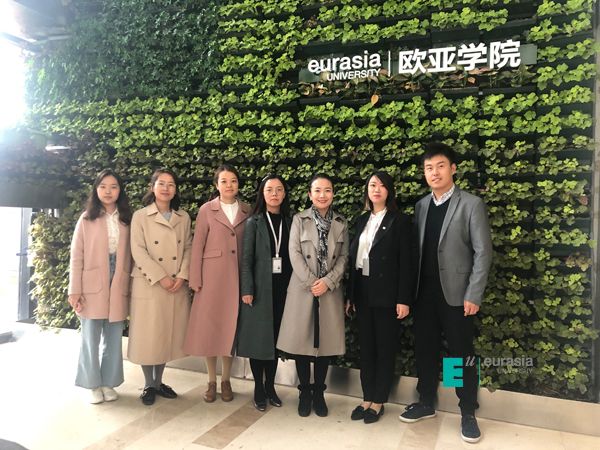
(Picture 1) Meeting

(Picture 2) Photo taking
In order to respond to the ten years strategic policy of internationalization, to continuously promote the internationalization process, and to strengthen the cooperation between Eurasia and other famous international universities, the delegation of University of Technology Sydney visit Eurasia and have a discussion with Xiaoyi Geng, the assistant dean of human settlements and civil engineering school and Jie Ding, the deputy director of international office on March 21st 2019.
The University of Technology Sydney (UTS for short) is located in Sydney, the financial and economic center of Australia. It is a famous public research university that full of vitality and focusing on innovation. It is also one of the famous universities in Australia. In the QS World University Rankings 2019, UTS was rated as the world's five-star university, ranking 160th in the world. UTS offers more than 130 undergraduate and 210 postgraduate courses, covering a variety of traditional and emerging disciplines. During the study period, the university will arrange students to carry out a wide range of professional practice.
At the beginning of the meeting, Kira Guo, head of admissions in China of UTS, introduced UTS briefly through video, covering the local conditions and customs of Sydney, the excellent geographical location, the architectural style of UTS, as well as the related introduction of the study fields and immigration majors. In addition, UTS also offers some interesting practical courses and experience courses, such as criminology professional courses, simulation court, simulation hospital, etc. He said that the same point between Eurasia and UTS is that we are student centered universities. Just like Eurasia, UTS serves the students heart and soul from scholarship establishment to international students service, from language training courses to careers guidance center.
Jie Ding, the deputy director of international office, introduced the history of Eurasia, the schools, the strategic development period and the future 10 years development plan to the UTS delegations through PPT, which got the high praise and recognition.
Xv Ting, the international project leader of human settlements and civil engineering school, gave a brief introduction about majors, enrollment, international transformation and undergraduate talent training plan. In addition, the associate dean mentioned the possible cooperation mode in the future, for instance teaching cooperation mode, study tour cooperation mode and study tour and scholarship system mode.
During the discussion between the two sides, Kira, a representative of UTS, said that the cooperation between universities needs to be step-by-step. From the perspective of engineering, the curriculum system of China and Australia is quite different, so the traditional engineering major cannot meet the requirements to set up international class, such as 3+2. But Kira said that the real estate management major of Eurasia matched with UTS related major well, so both sides can try to establish cooperation in this area. The leaders of human settlements and civil engineering also put forward the need for cooperation on another topic of this meeting: the academic qualifications promotion of faculties. Kira said that UTS welcomes teachers from Eurasia to participate in teaching as visiting scholars. However, it is very difficult to study for doctoral degree and related academic promotion projects in UTS. The main reason is that the period of studying for doctoral degree is very long and the teaching task in China has to be abandoned. It means the loss outweighs the gain. But Kira said that she would feed back the specific situation and cooperation intention to the relevant departments of UTS to lay the necessary foundation for possible cooperation in the future. At last, the two sides expressed their full affirmation of the tentative contact made during this visit and expressed high expectations for the next cooperation.
(International Office)

